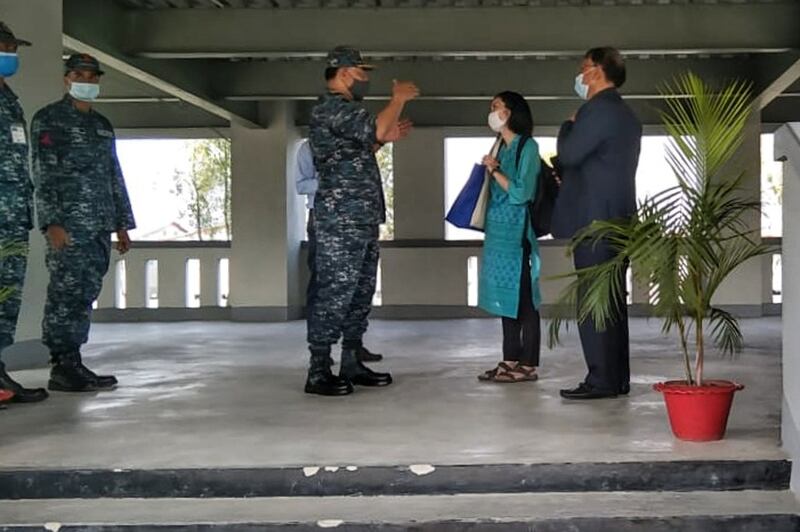A United Nations delegation on Wednesday arrived on an “initial” three-day visit to a Bay of Bengal island where Bangladesh has moved thousands of Rohingya refugees since December, a police official on the island told BenarNews.
The U.N. had been requesting a visit to evaluate the livability of the flood-prone island for more than two years, and humanitarian groups had criticized Bangladesh for moving refugees there without a thorough assessment of the site by international experts.
Kashiwa Fumiko, an assistant representative at the U.N. refugee agency UNHCR’s office in Dhaka, was leading the delegation, said Mahe Alam, a senior police official on the island known as Bhashan Char.
“The team will stay here until March 20. They had a meeting with the Rohingya people on Wednesday afternoon. They listened to the refugees who spoke about the facilities offered to them in Bhashan Char,” Alam told BenarNews.
He added that members of the Bangladesh Navy accompanied the U.N. officials, who travelled by ship from Chittagong in southeastern Bangladesh.
During the trip, U.N. officials will look at facilities built to support the refugee community, talk with Rohingya living there, and with government officials, said Mostafa Mohammad Sajjad Hossain, a UNHCR spokesman in Dhaka.
“This initial three-day visit will bring together experts from U.N. agencies engaged in the Rohingya refugee response in Bangladesh,” Sajjad told BenarNews.
Neither Sajjad nor Bangladesh officials commented on possible future trips by U.N. officials. They didn’t comment on the likelihood of a U.N. technical assessment team visiting the island either.
The government moved the first batch of refugees to the controversial low-lying island on Dec. 4. Since then, more than 14,000 Rohingya have been moved from crowded refugee camps in southeastern Cox’s Bazar district near the Myanmar-Bangladesh border to Bhashan Char.
Bangladesh houses some 1 million Rohingya, including more than 740,000 who escaped a brutal military crackdown in Myanmar’s Rakhine state, beginning in August 2017.
The government had said it spent about U.S. $280 million to construct housing, a large embankment, and other infrastructure on Bhashan Char in a bid to relieve pressure on the crowded mainland camps.
Authorities had said the facilities on the island were better than in the refugee camps.

Bangladesh Navy officials speak with members of a U.N. delegation as they arrive on Bhashan Char island in Noakhali District, Bangladesh, March 17, 2021. [Special to BenarNews]
“Better conditions here”
Some refugees on Bhashan Char who spoke to U.N. officials on Wednesday told them the conditions were satisfactory but that they would rather go back home to Myanmar.
“I have told them that we are in better condition here than in Cox’s Bazar,” Mohammad Selim, one of the relocated Rohingya, told BenarNews by telephone.
“I also told them that the Rohingya would immediately return to their homes in Arakan if their rights are guaranteed and their properties returned,” Selim said, referring to a coastal region of Myanmar that he knew as home before fleeing violence against his community by the military there.
Rafiqul Islam, a professor of peace and conflict studies at Dhaka University, said he would have expected the international community to have doubts about the liveability of Bhashan Char. Those doubts would go away after this trip, he said.
“It is natural for U.N. officials and the international community to be sceptical about the suitability of Bhashan Char because they see the island in the Bay of Bengal through satellite images. The images would naturally convince anyone that Bhashan Char was a prison-like isle,” Islam told BenarNews.
“But anyone seeing the facilities would be convinced it is not a jail; this is habitable land. I think the U.N. delegation and the international community would be convinced about the habitability of Bhashan Char when they witness the facilities in the island.”
